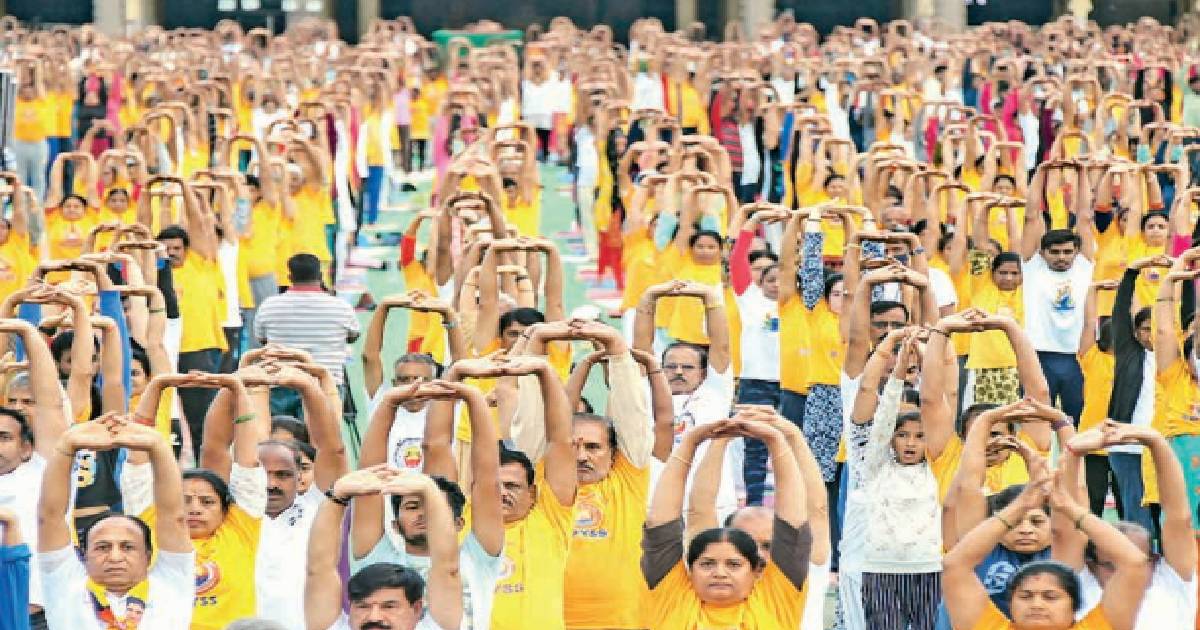Latest News
Reacting Mindfully!

With the moment ushering on 21st June as International Yoga Day, it is the time to sit back and reflect and acknowledge that we all experience suffering, discontent, or dissatisfaction. Acceding this predicament is the first step towards understanding the painful experience which is more relevant than ever before in the current excruciating times that we all are experiencing. With everything that is currently going on in the world, our stress levels may likely be heightened. For some people, the uncertainty of this time causes a lot of anxiety, especially the younger segment such as small children and teenagers. It’s important to realize and practice healthy ways of de-stressing as we learn how to deal with normal everyday life. While the world is gasping in bewilderment to save itself from the agonizing Effects of home -office and increasing stress on the younger generation which seem rhapsodical, looking back may hand us an enshrined solution in the form of yoga which may equip us to fight this battle.
International Yoga day is a reminder that from the ancient scripture to the Middle Ages until the very recent studies which are supported by scientific evidence, it is becoming very apparent that yoga is not only the strengthening of the body but also stabilizing the mind and heart through various breathing techniques. It is one form of physical exercise that works in synchronization with the mind and soul. There is ample literature available on yoga not only in India but also across Europe.
What makes yoga exclusive is, it’s being inclusive. People of all age groups, nationalities, and social backgrounds can practice it because yoga is accessible to all. There are various kinds of yoga practices, so it’s possible for anyone to start. Size and fitness levels don’t matter, there are modifications for every yoga pose. Apart from the real physical effect of stress and anxiety on our younger population, the mental health implications of this can be felt just as strongly. For those already suffering from mental health conditions or anxiety, the added stress can feel overwhelming and unmanageable. Anxiety thrives on uncertainty and being in a constant state of waiting for something to happen will only increase this. Anxiety and the manner in which we breathe are cojoint. The principles of yoga offer a wonderful, logical explanation to regulate stress. Studies have shown how, if practiced in moderation from an early age, yoga teaches you to train your brain for healthy emotional outlets and handle stress which seem almost crucial to teenagers.
Breathing and yoga are oftentimes associated with the same umbrella. While both activities encourage mindfulness, health, and relaxation. Yoga can get intense and serve as a workout depending on the level. Breathing, however, is effortless and can be practiced everywhere with being a little mindful. Often, when we are in a stressful situation, we get anxious and do not give our minds a chance to think logically. This is the situation where mostly the people of age group between 12 to 20 react frantically to the situation from day to day life. Breathing rightfully supports our emotional health by stamping out the information overload that we all experience daily. It allows us a clean space in our mind which in turn can cast us towards positivity. We not only feel revamped but we also become mindful of people and situations which lead us to a deep consciousness of life -force. Which the youth needs to invest in the future. Yoga fosters empathy and larger understanding, and it is worth observing that sympathy and receptivity lie at the very root of yoga’s first principle- helping others by helping oneself.
Yoga practice can help young people, especially students to develop a non-impulsive reaction to events. As Krishnamurti states “You can perceive totally, completely only when the mind is wholly quiet. So the professionals, the teachers, the gurus say you must sit in a certain posture, control your thought, breathe properly, and so on.” This will lead one to handle contradicting emotions. Do not take your breathing for granted, it’s magical when you know how to breathe right. Taking the time to breathe mindfully and deeply for a few minutes or so can already help you to see an improvement without even moving a muscle. The power of being still is just as important as the power of movement. Children need to be active but also they need mindful emotional clarity.
THE VIEWS EXPRESSED BY THE AUTHOR ARE PERSONAL
DR JYOTI JOSHI The writer is a soft skill, yoga trainer, business coach and English language instructor in Germany, Europe




.png)












.png)



